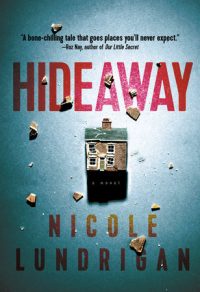
Hideaway by Nicole Lundrigan
Reviewed in Quill & Quire
July/August 2019
Publisher: Viking Canada
Things are not okay in the Janes house. Patriarch Telly has moved out to live with another woman, leaving 13-year-old Rowan and seven-year-old Maisy in the care of their mom. Gloria, the matriarch, is at best manipulative, at worst heartless and abusive.
ollowing Telly’s departure, Gloria’s treatment of the children deteriorates further. Upon finding out that Rowan has stolen some chocolate from a teacher’s purse, Gloria marches her son out to the woods behind their house, nails a board emblazoned with the misspelled word “THEIF” to a tree, and leaves Rowan to stand under it all night. She’s sure to let the boy know there are wolves in the woods. (There aren’t, but Rowan doesn’t know that.) It’s the kind of psychological abuse that some might describe as borderline “tough love,” though it quickly becomes clear from Rowan’s absolute terror that this type of punishment is neither novel nor benign.
During his ordeal, Rowan meets Carl, a homeless man with tinfoil threaded throughout his beard and a dog named Girl. Carl hears voices and suffers paranoid delusions, but Rowan is so desperate for understanding and the feeling of being cared for that he dismisses Carl’s outbursts and strange ramblings as harmless. After Gloria inflicts another horrific punishment, Rowan runs away to find Carl, and the two embark on a journey that ultimately heralds doom for them both.
Nicole Lundrigan creates a richly drawn small-town world for her characters to inhabit, imbuing the woods with a personality of their own. The nosiness and judgment rampant in the family’s downtrodden neighbourhood feeds Gloria’s outward performance of the doting mom and wife. Behind closed doors, however, she flips with lightning speed between adoration and savage neglect, manipulating her children into loving and fearing her in equal measure.
We witness the results of Gloria’s treatment of her children via their alternating first-person narration. Rowan’s growing resentment and ultimate desperation are palpable, but it is Maisy’s voice that really stings – Gloria has twisted her daughter’s perception of herself and the world around her so severely that Maisy no longer trusts her own experiences to be true. It’s a heartbreaking portrayal of the kind of abuse that doesn’t leave physical marks but scars the psyche horrifically.
When Carl’s erratic behaviour takes a turn for the worse, we think we know what’s coming. But Lundrigan craftily lures the reader to an even more devastating climax, the denouement of which satisfies even as it elicits sympathy, particularly for Carl.
Less a thriller than a psychological family drama, Hideaway is a potent exploration of abuse, desperation, coming of age, and broken trust. Rowan’s naivety and Maisy’s ache to please her mother are difficult to bear but lend power and authenticity to the story, while Carl’s struggle to balance his instinct to protect Rowan with the demons in his mind is fascinating and handled with great sensitivity. With her latest novel, Lundrigan proves she’s hit her stride.

